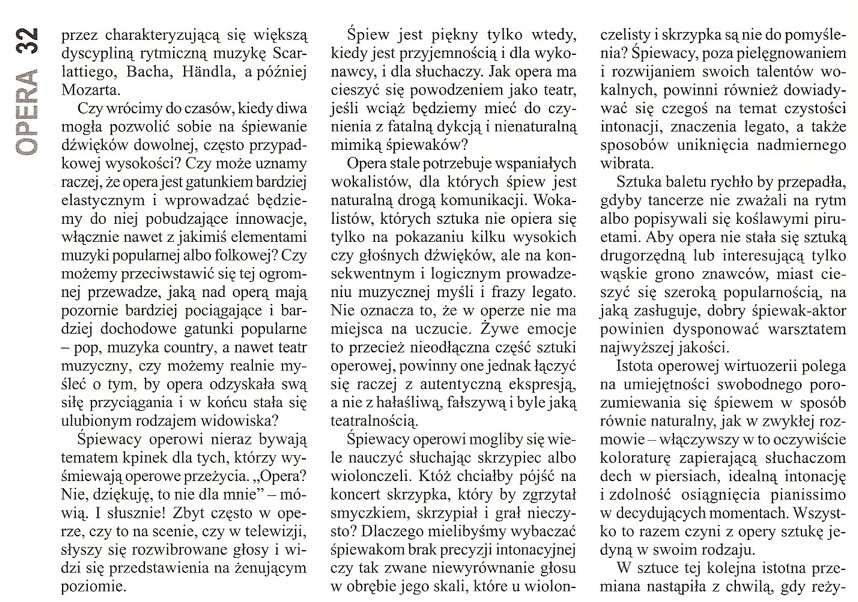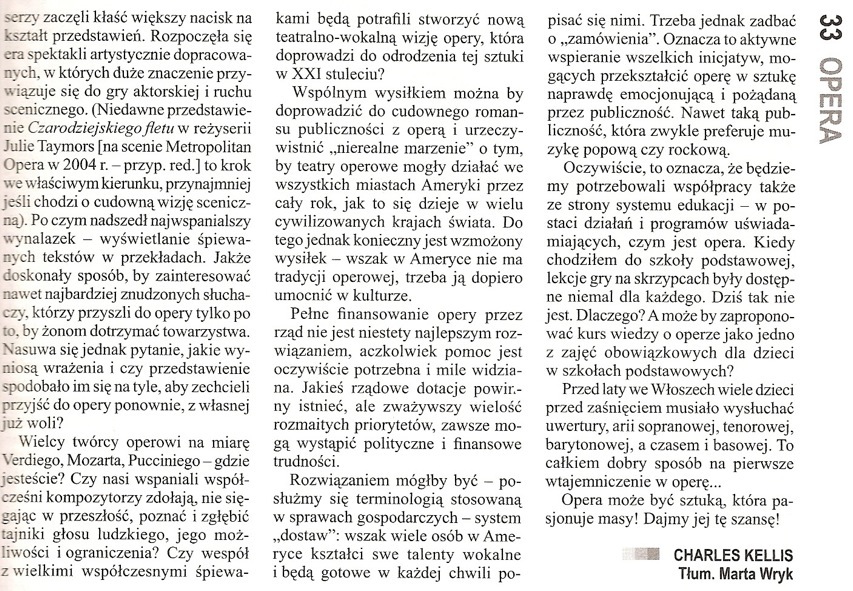CHARLES KELLIS


TWOJA MUZA (February - March) 2013/ English


AIDA
by Charles Kellis
The demands that Verdi asks from each of his characters, requires a fully developed, mature voice. His knowledge of the vox humane and it's unique possibilities demands the best. Whether It be -- tenor, soprano, mezzo, baritone or bass he uses his amazing knowledge, respecting each voice's individual limited vocal range, yet still committed to exploiting it's complete expanded parameters. This is all embedded in how he defines each voice with his command of expressive shadings and his use of varying colors ---all begging for a formidable technique. Verdi's operas have no sympathy for amateur or still unformed singers. This is singing at full throttled, yet technically nuanced manifestations and there is no way to hide from any possible shortcomings. You are totally exposed. Verdi uses a wide palette of stretching the extreme exposition of a singer's potential capacities. He knows how far he can go and never hesitates getting there.
In politics,"it's all about the economy, stupid"! Well, in Opera,"it's all about technique". (In order to sing Verdi, any singer, regardless of voice category, has to be complete. This involves singing all the notes as they are written, clearly defining the pitch and a vocal line that unifies the words into a grand theatrical vision. If you can sing Verdi's operas as he conceived them, stardom should become a natural progression of events in your artistic career.
In this Aida there was unfortunately not much of this kind of wonderful idealistic portrayal that we could at least hope for. Although some of his markings were "f f f f f", they were actually only suggestions of energetically expressive flavor and intent --not random uncontrolled chaos. Regrettably, the atmosphere throughout the whole first act seemed to create a contest of who could sing the loudest. This feeling progressed throughout the entire opera --minus various select tender moments, as in the final tomb scene when Radames and Aida sang with a little more subdued fluency. It was here that the tenor----- Tanner showed his ability to sing with a nice legato line. The role of Radames presents a potential early problem with "Celeste Aida", Verdi's most beloved and ever popular aria being sung at the very beginning of the opera. To be required to sing your best crowd pleaser at the very outset when you may be still warming up, can be very unnerving at the very least, but to be confronted with having to warm up the audience with your best piece --unless you already have the notoriety of a Caruso or Pavarotti can never be rewarding enough. Tanner attacked "se quell' guerrier io fossi" with some uncertainty and then when he came to "da me guidato" and "di menfi tutta". he was summarily outgunned by the aggressive trombones who were mostly beyond the top of their game all evening long. As he continued, however, he did show a voice of Verdian quality and some beautifully executed, clarion B flats. His upper voice continued to get better as he warmed up, while his middle range still persisted to be routinely unimpressive.
The Aida that night was given to Hee Jui? With "Ritorna vincitor" her basic instrument showed signs of what could and should be a truly gorgeous voice, as when she arrived at "parola, o numi, sperdete" and also her lovely attack on the B flat "Ah! sventurata". Her performance was marred, however, by what we can only call "vocal trouble". She was consistently flat when singing anything double forte. What exposed her pitch problem into greater urgency of attention was whenever she came down from a pressurized high note that was overly forced. In the final tomb scene where things got a little warmer and not quite so pressured, she did achieve some more easily pleasant sounds, but her pitch problem still continued to persist. Perhaps she was hired because of being able to produce a clear attack on some upper notes with a good ability to crescendo into a forte --one of her more favorable moments. As admirable, however, as that ability may be by itself, it does not carry a whole evening of uncertainty, just hoping for the best.
The initial "re-naturale", or "high D" for Amnasoro usually is the telling note that sets up the baritone for either a stellar or a mediocre performance. That is the note where a baritone can make his most impressive sound and it is also where he can set himself up badly for trouble. Fortunately, right after "non mi tradir", warning his daughter Aida not to disclose his identity as the king of Ethiopia, Mr.------managed beautifully and made me feel at ease with that first important "suo padre". He revealed a mellifluous baritone, conveying the role of Amnasoro with some measure of dignity and vocal security. Regardless of his mannered uneven inattentiveness to the actual note values in his attempt at trying to rewrite Verdi with some rather unremarkable expressive utterances, he nevertheless managed to keep his focus on the basic, dramatic requirements in keeping the progression of the Nile scene physically intact.
Amneris is one of the mezzo soprano roles that calls for a fully developed range. Like Eboli in "Ballo in maschera" it requires the mezzo to sing in what might be considered the notes of a strong soprano showing off the full resources of what should be a well organized voice. Regardless of her vocal power, Olga Borodina was not the most ideal Amneris. I have heard her as Carmen when her voice was delicious, including the beautifully resounding effortless quality of her lower register. Although impassioned in her pleading, "ah, non e' traditor" and her dramatic cursing of the high priests for their final judgement, "la vendetta del ciel", where her theatrical ability appropriately embraced the drama with chilling intensity, her voice still showed signs of vocal overblowing with some desperate lunging at a few unimpressive Bb's.
The production was well conceived from a conventional point of view, safely within the confines of normally constructed, modestly unpretentious surroundings. I have witnessed too many lavish, huge spectacles in the Arena of Verona and Rome's Caracalla to be at all moved by the two lone horses, bearing warriors, running briskly across the stage. The audience was obviously moved with strong applause for any living creatures that did not have to sing. The triumphal scene, although marked by some stunning costumes with their outstanding color and clarity, was unremarkable in it's rather pedestrian procession of the totally expected.
Maestro Luisi has inherited an orchestra of wonderful musicians, almost already bequeathed to him by Mr. Levine who through the years --painstakingly selected, nurtured and molded them into what may well be the finest opera orchestra in the world.
I wonder what Levine might have done with the overbearing implosion of the brass, particular the trombones, that at this performance seemed to be free wheeling time bombs ready to explode at any time they felt a need to exercise their aggressive virility. In Luisi's defense, however, I must say that I was very impressed with the overture as he sensitively introduced the initial, barely audible, solo violin that began with a kind of Toscanini effect of ---starting almost from nothing and gradually graduating into a crescendo that rose to huge proportions. A feat of measured slow, controlled, consistent movement taking you on a journey into the majestic world of Egyptian pyramids.
FINE




